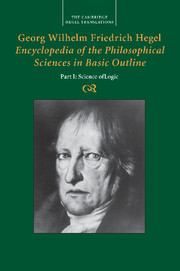 Georg Wilhelm Friedrich Hegel: Encyclopedia of the Philosophical Sciences in Basic Outline
Georg Wilhelm Friedrich Hegel: Encyclopedia of the Philosophical Sciences in Basic Outline Published online by Cambridge University Press: 30 September 2021
The concept is the free [actuality] [das Freie], as the substantial power that is for itself, and it is the totality, since each of the moments is the whole that it is, and each is posited as an undivided unity with it. So, in its identity with itself, it is what is determinate in and for itself.
Addition. The standpoint of the concept is in general that of absolute idealism, and philosophy is knowing conceptually [begreifendes Erkennen]. It is conceptual knowing insofar as everything that ordinary consciousness regards as an entity, and in its immediacy as independent, is known [gewußt] merely as an ideal moment in it. In logic at the level of the understanding [Verstandeslogik] the concept is usually considered as a mere form of thinking and, more precisely, as a universal representation. The claim, so often repeated from the side of sentiment and the heart, that concepts as such are something dead, empty, and abstract, refers to this low-level construal of the concept. Meanwhile, just the opposite holds and the concept is instead the principle of all life and thereby, at the same time, something absolutely concrete. That such is the case has emerged as the result of the entire logical movement up to this point and hence does not need first to be proven here. As far as the opposition of form and content is concerned in this connection, namely, with respect to the concept as allegedly merely formal, this opposition, like all the other oppositions held fast by reflection, is already behind us as something overcome dialectically, that is to say through itself, and it is precisely the concept which contains all the earlier determinations of thinking as sublated determinations in itself. To be sure, the concept needs to be considered as form, but only as infinite, fecund form that encompasses the fullness of all content within itself and at the same time releases it from itself. By the same token, the concept may also be called ‘abstract’, if by ‘concrete’ one understands what presents itself to the senses as concrete – what can be perceived in any immediate way at all. We cannot grasp the concept as such with our hands and, when it comes to the concept, we generally have to take leave of seeing and hearing.
To save this book to your Kindle, first ensure [email protected] is added to your Approved Personal Document E-mail List under your Personal Document Settings on the Manage Your Content and Devices page of your Amazon account. Then enter the ‘name’ part of your Kindle email address below. Find out more about saving to your Kindle.
Note you can select to save to either the @free.kindle.com or @kindle.com variations. ‘@free.kindle.com’ emails are free but can only be saved to your device when it is connected to wi-fi. ‘@kindle.com’ emails can be delivered even when you are not connected to wi-fi, but note that service fees apply.
Find out more about the Kindle Personal Document Service.
To save content items to your account, please confirm that you agree to abide by our usage policies. If this is the first time you use this feature, you will be asked to authorise Cambridge Core to connect with your account. Find out more about saving content to Dropbox.
To save content items to your account, please confirm that you agree to abide by our usage policies. If this is the first time you use this feature, you will be asked to authorise Cambridge Core to connect with your account. Find out more about saving content to Google Drive.